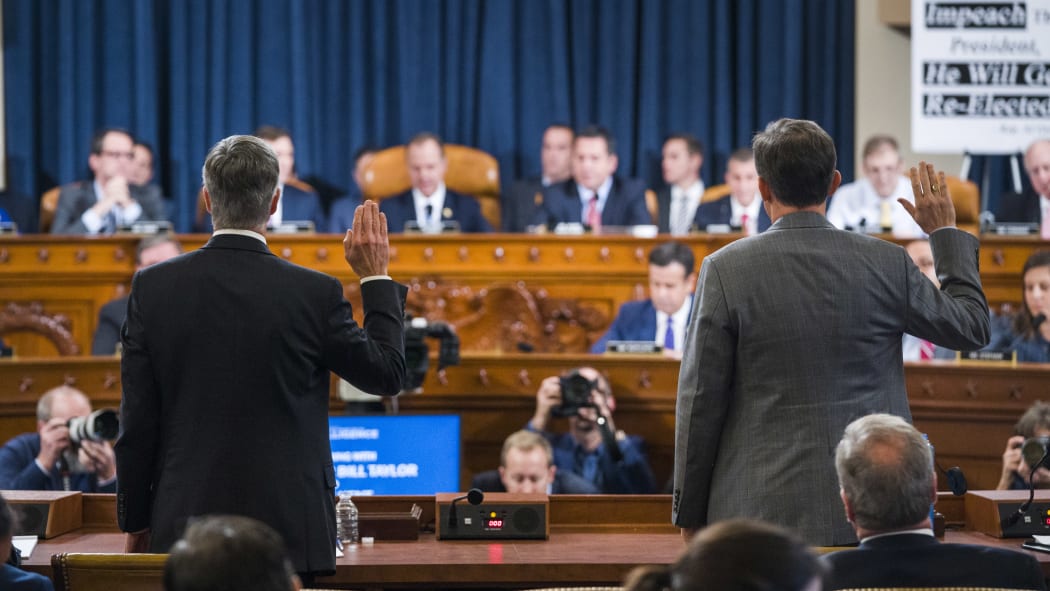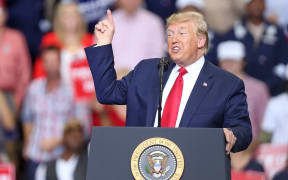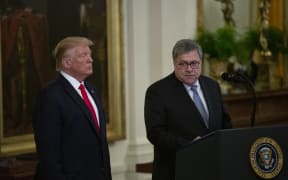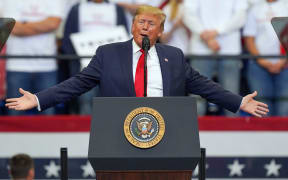The first public hearings in the impeachment inquiry into US President Trump are under way in Washington.

Charge d'Affaires at the US embassy in Ukraine Bill Taylor, left, and Deputy Assistant Secretary of State for Europe and Eurasia George Kent, right, are sworn in to testify before the House Permanent Select Committee on Intelligence. Photo: AFP
Mr Trump is accused of trying to press Ukraine into investigating political rival Joe Biden but he denies wrongdoing
Opening the hearing, Democrat Adam Schiff said the facts were not seriously contested, but Republican Devin Nunes says the whole process had been abused.
The first of two witnesses began publicly detailing his concerns that the Trump administration sought to tie military aid to Ukraine to an investigation of the Republican president's potential Democratic rival for the presidency, former Vice President Joe Biden.
Democrats leading the US House of Representatives probe have summoned three US diplomats - all of whom have previously expressed alarm in closed-door testimony about Mr Trump's dealings with Ukraine.
Democratic Representative Adam Schiff, chairman of the House of Representatives Intelligence Committee, opened the historic session - the first impeachment spectacle in two decades - in an ornate hearing room packed with journalists, lawmakers and members of the public.
Mr Schiff's accusations that Mr Trump abused his power was met by a staunch denial by the panel's senior Republican, Devin Nunes, of the Republican president's complicity in a saga that revolves around whether Trump and his aides improperly pressured Ukraine to dig up dirt on a political rival for his political benefit.
The day's two witnesses - William Taylor, the top US diplomat in Ukraine, and George Kent, the deputy assistant secretary of state for European and Eurasian affairs - followed with opening statements echoing their earlier closed-door testimony about their alarm over efforts to get Ukraine to open an investigation of former Vice President Joe Biden, a leading contender for the Democratic nomination for the 2020 election.
"The questions presented by this impeachment inquiry are whether President Trump sought to exploit that ally's vulnerability and invite Ukraine's interference in our elections," Mr Schiff said in his opening statement.
"Our answer to these questions will affect not only the future of this presidency, but the future of the presidency itself, and what kind of conduct or misconduct the American people may come to expect from their commander-in-chief," Mr Schiff said.
Mr Schiff added, "If this is not impeachable conduct, what is?"
This week's hearings, where Americans are hearing directly for the first time from people involved in events that sparked the congressional inquiry, may pave the way for the Democratic-led House to approve articles of impeachment - formal charges - against Mr Trump.
That would lead to a trial in the Senate on whether to convict Mr Trump of those charges and remove him from office. Republicans control the Senate and have shown little support for Mr Trump's removal.
Mr Nunes accused the Democrats of conducting a "carefully orchestrated smear campaign" and of using the hearings as a "televised theatrical performance."
He hewed to the Republican strategy of arguing that Mr Trump did nothing wrong or impeachable when he asked Ukraine's new president to investigate prominent Democrat Joe Biden, a former US vice president and key 2020 re-election rival.
"It's nothing more than an impeachment process in search of a crime," Mr Nunes said.
Mr Schiff said the inquiry looks at whether Trump sought to condition official acts such as a White House meeting or US military assistance on Ukraine's willingness to carry out two political investigations that would help his re-election campaign.
"And if President Trump did either, whether such an abuse of his power is compatible with the office of the presidency?" Mr Schiff asked.
The focus of the inquiry is on a 25 July telephone call in which Mr Trump asked Ukrainian President Volodymyr Zelenskiy to open a corruption investigation into Biden and his son Hunter Biden and into a discredited theory that Ukraine, not Russia, meddled in the 2016 US election. Hunter Biden had worked for a Ukrainian energy company called Burisma.
Democrats are looking into whether Mr Trump abused his power by withholding $391 million in security aid to Ukraine - a vulnerable US ally facing Russian aggression - as leverage to pressure Kiev into conducting investigations politically beneficial to Mr Trump. The money - approved by the US Congress to help Ukraine combat Russia-backed separatists in the eastern part of the country - was later provided to Ukraine.
Trump 'cared more' about Biden investigation that Ukraine
William Taylor, a career diplomat and former US Army officer, previously served as US ambassador to Ukraine and is now the charge d'affaires of the US embassy in Kiev, was the first witness to speak.
One revelation in particular drew attention, showing Mr Trump's keen interest in Ukraine investigating political rival Joe Biden.
Mr Taylor said a member of his staff overheard a 26 July phone call between Mr Trump and Gordon Sondland, a former political donor appointed as a senior diplomat, in which the Republican president asked about those investigations and Sondland told him that the Ukrainians were ready to proceed.
Following the call - which occurred a day after Mr Trump had asked Ukraine's president during a phone call to conduct these investigations - the staff member asked Mr Sondland, the US ambassador to the European Union, what Mr Trump thought about Ukraine, said Mr Taylor.
"Ambassador Sondland responded that President Trump cares more about the investigations of Biden, which Giuliani was pressing for," Mr Taylor testified, referring to Mr Trump's personal lawyer Rudy Giuliani.
Asked by Adam Schiff, the committee's Democratic chairman, if that meant Mr Trump cared more about the investigations than about Ukraine, Taylor said, "Yes, sir."
Mr Taylor said he was more alarmed by a hold Mr Trump had placed on security assistance to Ukraine than the dangling of a possible Trump-Zelenskiy White House meeting:
"It's one thing to try to leverage a meeting in the White House," Mr Taylor said. "It's another thing, I thought, to leverage security assistance to a country at war, dependent on both the security assistance and the demonstration of support. It was much more alarming," he added.
Mr Taylor said he found two channels of US policy toward Ukraine - one regular and one "highly irregular" - and recounted how a Trump meeting with the Ukrainian president was improperly conditioned on Kiev agreeing to investigate Burisma, where Biden's son had been a board member, and the debunked notion of Ukrainian interference in the 2016 election.
Mr Kent, who oversees Ukraine policy at the State Department, said he had been alarmed by efforts by Mr Giuliani and others to pressure Ukraine.
Mr Kent said Mr Giuliani - who Democrats have accused of conducting a shadow foreign policy effort in Ukraine to benefit the president - had conducted a "campaign full of lies" against Marie Yovanovitch, who was abruptly pulled from her post as US ambassador to Ukraine in May. She will give public testimony on Friday.
Mr Kent said he did not belive the United States should ask other countries to engage in selective, politically associated investigations or prosecutions against opponents of those in power.
"Such selective actions undermine the rule of law regardless of the country," Mr Kent said.
The public hearings are scheduled for Wednesday and Friday US time.
- Reuters / BBC




